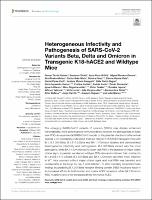Heterogeneous Infectivity and Pathogenesis of SARS-CoV-2 Variants Beta, Delta and Omicron in Transgenic K18-hACE2 and Wildtype Mice
Author
Date
2022-05Permanent link
https://hdl.handle.net/11351/8054DOI
10.3389/fmicb.2022.840757
ISSN
1664-302X
PMID
35602059
Abstract
The emerging SARS-CoV-2 variants of concern (VOCs) may display enhanced transmissibility, more severity and/or immune evasion; however, the pathogenesis of these new VOCs in experimental SARS-CoV-2 models or the potential infection of other animal species is not completely understood. Here we infected K18-hACE2 transgenic mice with B.1, B.1.351/Beta, B.1.617.2/Delta and BA.1.1/Omicron isolates and demonstrated heterogeneous infectivity and pathogenesis. B.1.351/Beta variant was the most pathogenic, while BA.1.1/Omicron led to lower viral RNA in the absence of major visible clinical signs. In parallel, we infected wildtype (WT) mice and confirmed that, contrary to B.1 and B.1.617.2/Delta, B.1.351/Beta and BA.1.1/Omicron can infect them. Infection in WT mice coursed without major clinical signs and viral RNA was transient and undetectable in the lungs by day 7 post-infection. In silico modeling supported these findings by predicting B.1.351/Beta receptor binding domain (RBD) mutations result in an increased affinity for both human and murine ACE2 receptors, while BA.1/Omicron RBD mutations only show increased affinity for murine ACE2.
Keywords
SARS-CoV-2; Viral load; Wildtype miceBibliographic citation
Tarrés-Freixas F, Trinité B, Pons-Grífols A, Romero-Durana M, Riveira-Muñoz E, Ávila-Nieto C, et al. Heterogeneous Infectivity and Pathogenesis of SARS-CoV-2 Variants Beta, Delta and Omicron in Transgenic K18-hACE2 and Wildtype Mice. Front Microbiol. 2022 May;13:840757.
Audience
Professionals
This item appears in following collections
- Col·lecció especial COVID-19 [945]
- HVH - Articles científics [4476]
- VHIR - Articles científics [1751]
The following license files are associated with this item:

 Private area
Private area Contact Us
Contact Us








